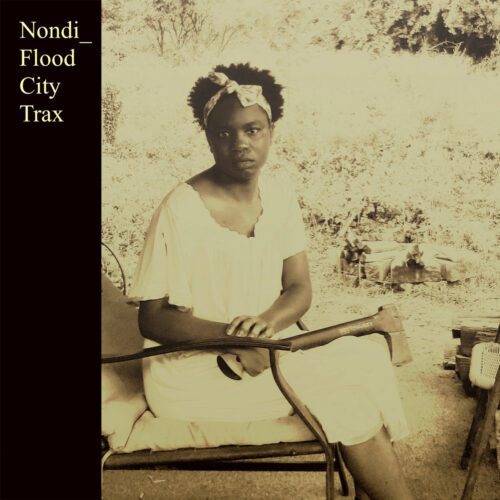How do you bear witness to the loss? Of a loss which is unknown to us but which we nevertheless know is irrecoverable? And how do you do it with music? On Flood City Trax, producer, and electronic artist Nondi_, aka Tatiana Triplin, explores this affective desert. Completely by sound.
From Johnstown, Pennsylvania, the artist’s musical profile has been built online. She draws inspiration from genres such as footwork, breakcore and Detroit techno, which she experiences on the web. This online mode of sourcing and creation comes out very clearly in Nondi’s music. It gives off an impression of dreamy loneliness, which also has something to do with the physical place of its creation.
The artist says of her album that she seeks to capture the feeling of life in Johnstown, particularly the isolation of poverty there. The history of this city is dark: several floods ravaged it, in 1889 and in 1977 (hence the nickname “Flood City,”) and left a tragic mark from which it is still struggling to recover. “There is very little to do, the buildings are destroyed or condemned. Everything is old, but at the same time, it’s as if the past has disappeared,” she explains on her Bandcamp page.
It is therefore a deep feeling of desolation that Tatiana Triplin manages to communicate on this album, so much so that we almost have the impression of having lost something without really knowing what. To have escaped something that escapes us. This melancholic loss, of which even the object is unknown, haunts the music but, at the same time, pushes it to exist. Triplin is right in going lo-fi, this intentional data loss fits the concept perfectly. The same is true for the album cover, designed to look like a yellowed and found historical photo, a little creepy, just enough to sow doubt. A lost story among many others.
On the sound side, we have here a talented artist. Nondi_ crafts ethereal atmospheres borrowing from genres we know (techno, breakcore, glitch), but she makes them almost extraterrestrial. The beginnings of the first piece leave this impression of being inside a pinball game lost in space. In fact, the whole album sounds a bit like retro-indie-experimental video game music from another dimension. A three-quarters developed game whose greatest beauty would be the bugs. It’s exotic but strangely enchanting, and we don’t complain about staying there.
I would say that even if the sound in the strict sense doesn’t always match, the spirit of the album is definitely ambient. The different pieces aim to put us in this contemplative state as if passing through time. As much with the softer tracks as with the pounding ones, the objective is achieved: as the album progresses, we feel transported into a space with fuzzy details, with disintegrated corners, as if we were in a virtual reconstruction of Johnstown which disintegrates a little more over our steps. A ghost town in a computer, with no wind; remnants of unoriginated sounds; rays of light without heat.
With a single idea, an image, and an ability to handle sound, Nondi_ tells this story of which we only know the end. We feel the old voices trying to come to the surface, but they are too far away for us to reach out to them. It’s helplessness in the face of time, the disturbing feeling of no longer remembering the face of an old acquaintance. Despite everything, by mixing Johnstown and electronic music; historical tragedy, and web phenomena, we are perhaps trying to prove the impossible, to make music a defibrillator. Perhaps, on the contrary, it is only a last look, immortalization on the contrary.
In short, Flood City Trax seems to play even louder in our heads when we stop it. Failing to be able to find the lost past, the album finally surprises by making memory its home. It’s completely successful.
























